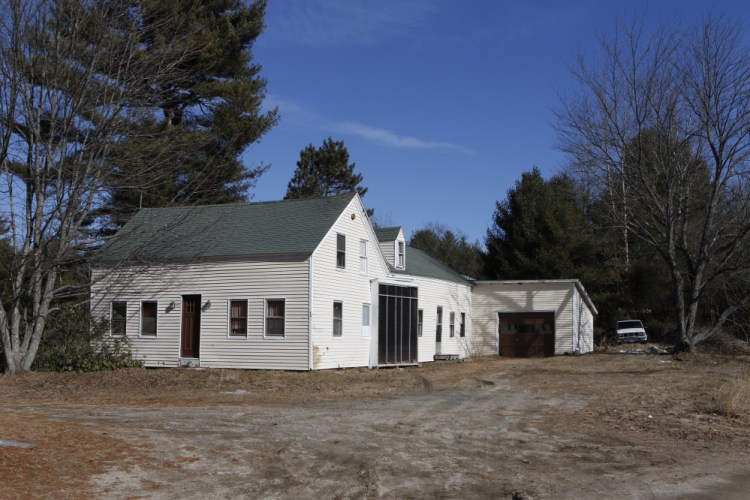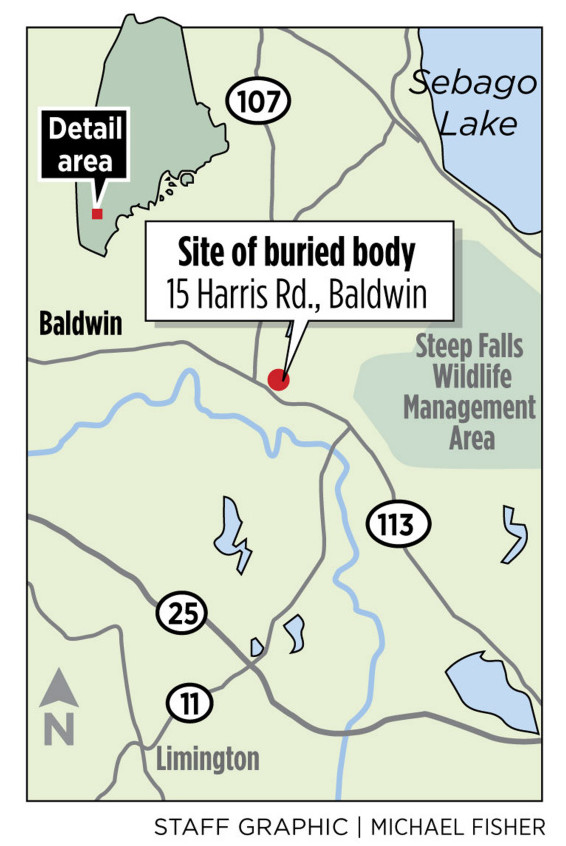EAST BALDWIN — Carolyn and Shawn Farnell led lives so quiet, they seemed to be invisible.
On a dirt road where everyone knows everyone, the mother and son were private, if not actively unfriendly, neighbors said.
But the curtain of anonymity that surrounded them was peeled back this weekend, when investigators spent seven hours painstakingly digging up Carolyn Farnell’s remains from a clearing behind their home.
She was placed there, authorities said, by Shawn Farnell, 43, who was carrying out his mother’s wishes to be buried on the property, family members have told police.
No charges have been filed, and foul play is not suspected in Carolyn Farnell’s death. The 72-year-old woman was in failing health and didn’t want to go to a hospital, the family members told police.
But the unorthodox backyard burial is under investigation because Shawn Farnell had neither a death certificate for his mother nor a permit to bury her, police said. And it has left residents to speculate about who the Farnells are, why a woman who had moved in only recently would seek to be buried there, and why no one knew about the burial.
The Farnells lived in a tan, aging house at 15 Harris Road, where piles of scrap wood and a rusting Chevy van are the property’s only adornment. With no property or vehicles registered locally, the Farnells had little reason to stop into the town office just a few miles away on Route 113.
“I didn’t know anybody was there,” said Debbie Wakefield, the town clerk in Baldwin, a Cumberland County municipality so small that she also is the registrar of voters, the tax collector and the treasurer. “It’s like they never existed. It’s kinda weird.”
It isn’t even clear if the home where the Farnells lived belongs to them. Purchased in January 2012 after being foreclosed on, the property is officially owned by Back East Property Management LLC, of Fairbanks, Alaska. Yet the state of Alaska has no record of such a corporation, and its address appears to be a residence in Alaska where the Farnells are neither listed as past tenants nor as current owners.
No one answered the door Tuesday at the Farnell home, where the side door is sealed by police evidence tape. A call to a number listed for Shawn Farnell in Vermont was not returned.
Silence from the Farnell home is nothing new for the residents of Harris Road and nearby Bishop Delisio Lane.
Hazel Drew lives barely 50 yards from the Farnells’ home, yet could never get close to them, she said.
Drew estimated that Shawn Farnell lived there alone before his mother joined him last fall. Around that time, Drew stopped by to say hello, knocking on their door. Carolyn Farnell answered, and the two had a pleasant conversation.
“She was a lovely lady,” said Drew, 79. But the next day, Shawn Farnell put an end to the visits. “He came out to the door and said, ‘Get out of here and don’t you ever come back.’ If he was around I couldn’t go over there.”
Robert Kelley and his wife, Marcelle, were surprised to learn that Carolyn Farnell was a resident there, let alone that she had been quietly buried out back.
“I didn’t even know a woman lived in there,” Marcelle Kelley said.
Another neighbor, Ken Strout, said he would wave at Shawn Farnell as he drove past, but instead of waving back, Farnell would recede into his garage.
“They were very unfriendly,” said Strout, 64.
Burial on private land is legal in Maine, but the state requires people to first notify their municipality or county so the burial plot can be added to land records, said Joe Watson, funeral director at Watson Neal and York Funeral Home in nearby Cornish. After the family burial plot is formalized on paper, the owner must mark it as a cemetery, Watson said. There also is the matter of a death certificate.
A doctor, usually someone’s attending physician at the time of death, must sign the death certificate, which is maintained as a vital record and held by the city or town where someone dies. If the death is suspicious or unattended, the state Office of Chief Medical Examiner would generate the death certificate, Watson said.
Only state-certified funeral directors or the medical examiner may transport a corpse without first obtaining a permit, Watson said.
All others must pay $20, fill out a form at town hall and present the death certificate before moving the body to its final resting place, he said.
“Even if it’s from the bedroom to the back 40, you need that transit permit,” Watson said. “Most people don’t try to do things themselves.”
Send questions/comments to the editors.




